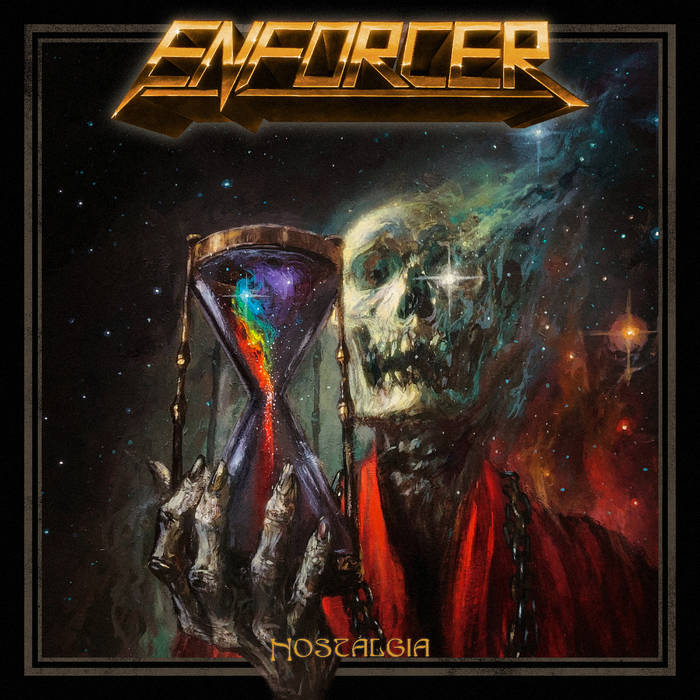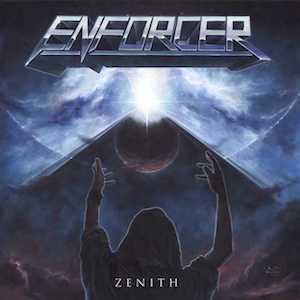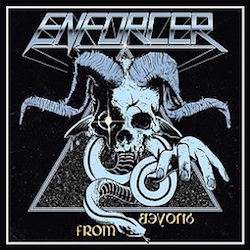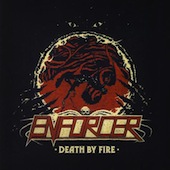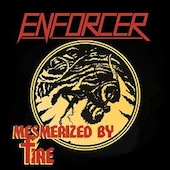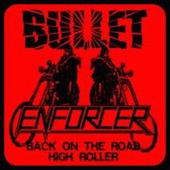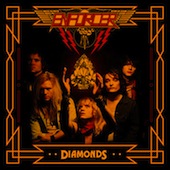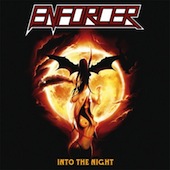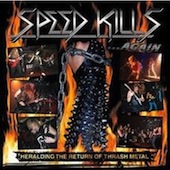Enforcer - Interview
When the 80's came, heavy metal was followed by many sub-genres which came along throughout the years, and in that wave of sub-genres we started gradually losing traditional heavy metal, especially in the 90's when more commercial sub-genres like groove metal, rap metal and nu metal became the center of attention. However, things would take a different turn in the mid 2000s when heavy metal bands of the new generation resurrected this lost gem from the ages of yore and dedicated themselves to preserve the spirit of old-school heavy metal. Nowadays, this wave of bands would be later known as the "New Wave of Traditional Heavy Metal", the saviors of metal and the true "Defenders of the Faith". Many bands of NWOTHM still come and go, but some of the bands which are considered the key figures who started it all are very much still around. One of those figures is none other than Sweden's legendary heavy/speed metal band Enforcer, which originally started as a solo project by Olof Wikstrand in 2004 and some years later it grew in popularity, only to become one of the most respected and beloved metal acts of the modern world. Like many people that night, I was very lucky to see Enforcer performing in Club Fest in Zemun/Belgrade with Primitai (UK) and Patrias (Serbia), and oh boy did Enforcer deliver from the moment they hit the first note. At some point, when the band started doing the cover of 'Let Na Drugi Svijet' by Divlje Jagode (Wild Strawberries), the audience in the front row started climbing onstage to sing along with the band, and I also ended up with the rest not long after. It was truly a night to remember, an experience unlike any other that will be stuck with me for the rest of my life. The usual comments from that night praise the fact that the gig was a pure and authentic 80's heavy metal experience for a variety of reasons. As for Enforcer this year, they were quite busy with the release of their successful and highly praised sixth album "Nostalgia", and have recently toured Europe with Destruction, Whiplash and Crisix after the two gigs in Croatia and Serbia. For this special occasion, I had the pleasure to speak with the band's founding member, frontman, vocalist and guitarist, none other than the man himself, Olof Wikstrand. Please join me as we exchange some words regarding Enforcer's gig in Zemun/Belgrade, their new album "Nostalgia" and many other things that might interest you.
Vladimir
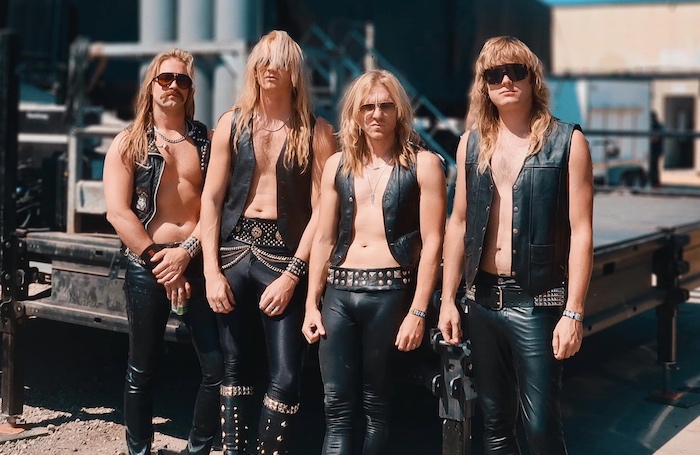
Greetings Olof! How are you doing brother?
I'm pretty great. Just got back home from tour, we've been out for a couple of weeks with Destruction, Whiplash and Crisix, and it's been a pretty great time. So yeah, we're good, trying to adjust to a normal life at home at the moment.
Enforcer's gig in Belgrade was a night to remember, an absolute blast of an experience unlike any other, especially when the audience joined in to sing the cover of 'Let Na Drugi Svijet' (Divlje Jagode). What was your reaction to the general feedback from the audience, including that particular moment when we all climbed on the stage and sang Divlje Jagode?
I think we knew somehow since we played the Exit festival a couple of years ago that we had a strong following in the Balkan and I think that was like why we did this these two shows also, but it's also something very special to come to a small club with like a high intensity crowd which is like completely mind -blowing, it was an amazing experience to see so many dedicated fans over there and to hang out with all you guys and just having a blast. I think that was incredible and that moment when the guys climbed the stage that was just over the top and I'm happy to see that we can play a song that makes people go wild.
Serbian fans certainly missed Enforcer for some time and it was a wonderful revisit for many people who came to see you, to some it was an even crazier show than your previous gig at the Exit Festival. How did you feel when you came back to Serbia after 4 years since your previous visit?
I think I kind of answered that with the previous question, but it felt great you know. You come for the first time you play a festival, you hopefully make some fans and you come back a few years later to do like your own thing and see what the show at such a festival would give. We had a great time both times.
I always wanted to know how you guys came up with the decision of covering Divlje Jagode to include it as a bonus track for your previous album "Zenith". Where did the idea come from? Also, are Divlje Jagode considered a popular band amongst rock and metal fans in Sweden?
Nobody really knows Divlje Jagode in Sweden. I think that the only reason to why people know it here is because we hyped the band. As far as I know, when I discovered them first, nobody knew about them outside of Yugoslavia a lot, except from like very dedicated followers. But in our generation and among the platform and our fan base, I don't think that was like a very popular band at that time. So I would like to think that we spread the word of the utterly excellent band among our fan base and our network of people who are into old school metal around the world. The idea came from the fact that I always like to do covers, you know, but I like to do covers with a twist and it's always been like that. We have always been digging up old bands, you know, and very obscure stuff and try to like produce it and make it sound super professional so we really can make a song our own. I discovered this song and I thought it was like a great idea to make it our own by translating the lyrics into English. And that was just an idea of how we could make that song unique and put our touch to it. It's simply just a great song and it's super catchy and it really fits with our style, I think.
The release of your sixth album "Nostalgia" was very successful, the immense hype is still very much present half a year later. Could you tell me a bit about the album's overall concept and why the name "Nostalgia"? What's the special story behind the name?
Well, I think that the name of the album came from the song which I thought had the strongest message of all the songs. There's a lot of songs on the new album, which is simply about heavy metal itself and at the same time I wanted to push like a little bit more of the deeper message of it to make that an album cover and more or less like a overall concept of the album, and the story of the song is about just realizing that time passes and it's eventually gonna destroy not only us and we, but all organic matter in the universe and it's like time is the most destructive force. Just looking back on everything that has happened, everything that once was and see how time has changed everything or destroyed everything is like a very powerful subject that is just a bit of the concept.
When working on new stuff, what is in your opinion the key element or key ingredient necessary for a good Enforcer song? Was there any important task during the songwriting and recording process that you wanted to accomplish with the songs for Nostalgia?
There's two things: First of all, it's to try to get as much energy into the music as possible. So when you listen to it, you will feel an immense wave of energy. That's one thing. The second ingredient I think is that everything that we do should be memorable and it should be able to be sung with a large crowd where everybody knows the words. So whether it's complicated or if it's simple, that's the two key elements, I would say. And how you would make that happen, that's another question. But that's a play between everything, how you construct music with lyrics that are simple yet not stupid and the same with riffs, keep things simple without things being stupid and that's a thin line to construct riffs that you feel are simple but yet hasn't been done, so you can still put your unique flavor to it. I think that's a little bit on how I'm thinking when I'm composing stuff.
Enforcer's 20th anniversary is nearing, looking back it started as your one-man project and now fast forward to present time your sixth album came out this year. If someone told you back then that Enforcer will become a big thing in the world of modern metal and inspire millions of metalheads, would you have believed them or told them that they were crazy?
I think very early on I realized that the concept that we had or that I had at that time was very special because there weren't any bands like that around anymore and I got a lot of you know appreciation from the scene very early on. The goal has even since, maybe not from the very beginning, but from a few months or maybe a year into our career has been to make Enforcer the biggest band in the world because I truly believe that we have the capacity to do so. So even if we're not the biggest band in the world, even making it one percent on that road is an achievement I think, but we worked really hard for this, I mean I dedicated my life to this band and to make all this happen.
Something that I always found interesting is that Sweden has always had an everlasting international success in every form of metal/rock sub-genre throughout the years, and Enforcer is definitely no exception. How would you explain this phenomenon on why Sweden's metal and rock music, be it old-school or new-school, always remains so popular and influential even in this modern age?
I think that we have an attitude here, we're very liberal in this country and the idea of chasing a career within music that maybe seems to many other people in different countries like it could be absolutely insane. Here in Sweden where we are kind of taught to follow our dreams and if our dreams fail we can always pick up something else you know. We can go educate ourselves and do whatever you want with our lives. So I think that liberalism that we have here encourages people to follow their dreams. Also we have a pretty good, or we used to have at least a pretty good, pretty good, you know, social security system. So if everything fails, you can always get a second chance. I mean, I don't know what it's like in Yugoslavia, but I don't know what would your mother tell you if you were 20 years old and said that you wanted to quit your job and do music full time and get out on tours? I think she would like beat you, that's because there's just a different attitude here. I don't know if it's because we have a tradition of music, but we have a tradition of entrepreneurship and to just work hard for something that you believe in, whatever it is. So yeah, I think we just have a lot of bands who do this with big dreams and of course they all inspire each other, whether it's old school, new-school, or if it's metal, or if it's pop, or whatever it is, you know.
A lot of people that came to see you in Belgrade praised your music for saving their lives during their troubled times. How do you react knowing that there are people in the world that praise you for keeping the spirit of old-school metal alive and also say that Enforcer saved/changed their lives?
Yeah, well, I'm happy that my music reaches out there and that people listen to it and that people are touched by whatever we do. I'm really happy to hear that people take their music towards themselves in such a way that they present later that it had like a life changing moment. I think that's really cool and I get very complimented by such things, that makes me motivated to keep on doing what I'm doing.
I have a very unusual question for you, and that is: since Enforcer is regarded as one of the key figures in the New Wave of Traditional Heavy Metal, which is significant for reviving the old-school sound from the late 70's and 80's, what do you think how it would have been like if Enforcer as a band was formed in that era 30-40 years ago and was actually there when New Wave of British heavy metal, speed and thrash metal were on their uprising? Could you even imagine Enforcer sharing the stage with bands from that era?
We have played with many of these bands out of this era, and I'm friends with a lot of older people who did this 30-40 years ago, but I don't know, I mean, at the same time, I think Enforcer wouldn't be the same, maybe we would have developed in a completely different direction. That was more contemporary. You gotta think about it, in the 70s and 80s this type of music was mainstream music and people who did this were mostly people who were into mainstream music. Now it's a very, very narrow niche for people who have a very dedicated interest in just this thing. It's a global movement now, and back then it was a local movement on a more local level. I think with that being said, I think that we've been very dedicated to exactly what kind of style we're playing and have been playing from the beginning and we're not so willing to change after trends and whatever happens in society around us. I think that I've used a lot of that knowledge with whatever happened later in the 80s and in the 90s, and used that fact to know even more and stronger what I want to be and what I don't want to be. The decline of metal in the 90s is something that I always have in mind that I work against and all the 90s trend bands and 2000 bands and trendy melodic metal and screamo core and rap music and stuff like that is something that maybe I would have thought that was cool in the 90s but now I hate it with passion and I want to keep it as long as far away from Enforcer, to keep Enforcer the most true band in the world. It's a bit of speculation there, but I think that's just to summarize this question. I think that Enforcer is started up and Enforcer has the sound that it has because of the history that I learned from.
I know you're having quite the busy year working with Enforcer, but you also work as a producer and you were recently working with two other excellent bands which released their new albums this year, that being Tailgunner (UK) and Malokarpatan (Slovakia). How was it working with both of these bands on their new releases for this year?
I think it's been great. I think that I have a lot of knowledge in metal in general and I think whatever I can bring to other bands I believe in is, and if other bands would like to have something for me. I think it's a great way of both working for myself and for other bands and whatever I can bring to bands that I like. I think that's cool to make it better, because I've collected a lot of knowledge throughout the years, both about the music business but also about music production and how music works. I wish that I knew all these things when we started but that's just things that you learn along the way, so I'm happy to give other bands what I know and I love working creatively whether it's for myself or it's for others, so that's just what keeps me going.
Thank you so much for doing this interview, Olof! I truly hope we'll see Enforcer again in the near future and once again witness this spectacular experience. Best regards to you and the band!
Thank you very much!
Discography
Upcoming Releases
- Morrath - Obscure Abominations - Feb 25
- Chalice - Divine Spear - Feb 27
- Blackwater Drowning - Obscure Sorrows - Feb 27
- Vide - Aux Enfants Des Ruines - Feb 27
- The Leaving - The Leaving - Mar 06
- Serpent Icon - Tombstone Stories - Mar 06
- Insect Inside - Reborn In Blight - Mar 06
- Triumpher - Piercing The Heart Of The World - Mar 06
- Lömsk - Act II - Of Iron And Blood - Mar 06
- Monstrosity - Screams From Beneath The Surface - Mar 13
- Against I - Anti Life - Mar 13
- Empire Of Disease - While Everything Collapses - Mar 19
- Putred - Blestemul Din Adânc - Mar 20
- Gaerea - Loss - Mar 20
- Diatribes - Degenerate - Mar 20
- Zerre - Rotting On A Golden Throne - Mar 27
- Foetorem - Incongruous Forms Of Evergrowing Rot - Mar 27
- Cryptworm - Infectious Pathological Waste - Mar 27
- Antrisch - Expedition III: Renitenzpfad - Mar 27
- Cruel Force - Haneda - Mar 27

